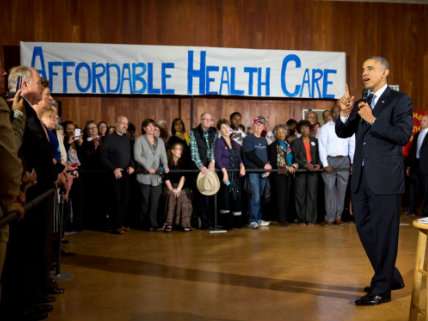How Long Will Health Insurers Continue to Put Up With Obamacare?
People are gaming the system, and losses in the health law's exchanges are piling up.

Obamacare's defenders have long insisted that its mandate to purchase health insurance was necessary to prevent people from gaming the system—signing up for coverage under the law in advance of expected high medical bills, then dropping coverage after those expenses have been incurred. Combined with a limited annual enrollment period, the mandate would prevent that sort of behavior, ensuring that everyone paid consistently into the system.
To make sure this plan works, however, requires fairly stern enforcement: Everyone either buys coverage or pays a fine, and those who don't have to wait until next year's enrollment period to get insurance. Ideally, almost everyone buys coverage and then stays covered, and it all just works.
In practice, that's not how it's turned out. Enrollment has been more sluggish than initially expected, with just about 12 million sign-ups likely this year. That's better than the 10 million or so officials projected back in October, but far less than the 21 million the Congressional Budget Office estimated as the law was taking shape.
Part of the problem seems to be that people are finding ways to game the system by signing up outside of the limited annual enrollment period and then dropping insurance shortly after. The law has a number of exemptions that allow people to buy coverage at any time throughout the year, such as changing or losing a job, having a child, moving, and getting married.
The people who come in via those special enrollment exemptions, it turns out, are far more expensive to cover. In an earnings call last November, an executive with UnitedHealth, the nation's largest insurer, said that people buying in outside of the standard enrollment period cost about 20 percent more. UnitedHealth, which covered about 700,000 people through Obamacare's exchanges last year, issued a bleak warning about its losses in the exchanges, which it put at about $425 million, and declared that there were no indications that the picture would improve in the coming year. The company threatened to drop out of the program entirely.
UnitedHealth's announcement was understandably viewed by many as bleaker than was really accurate, an attempt to get all the bad news out of the door at once. But it turns out that the company's losses were actually far worse than initially estimated. On Tuesday, the company downgraded its earnings forecast, and said that losses would probably be more like $500 million.
The administration responded this week by tightening rules surrounding the special enrollment periods, eliminating a half dozen special events that would qualify someone to sign up outside the standard enrollment period, at any time during the year.
This move may be too small a move to make much difference. There are still dozens of qualifying events left on the books, giving motivated people plenty of leverage and opportunity to sign up mid-year. Or it may mean that, at the margins, more people don't sign up at all, further depressing the low overall sign-up totals.
The big long-term question raised by all this is whether Obamacare can keep insurers on board. UnitedHealth's participation isn't strictly necessary to keep things going, but it may signal a larger problem.
Aetna, for example, has already dropped out of the exchange market in two states. A dozen of the 23 non-profit co-op plans backed by the law have already closed up shop, causing about 600,000 people to lose health plans, and a Politico analysis indicates that most of the remaining co-op plans are in trouble. Blue Cross Blue Shield of Texas and North Carolina both lost a sizable chunk of money on its exchange business during the program's first year. The financial outlook for a number of insurers participating in Obamacare, in other words, doesn't look good. And there are few signs that it is set to improve in the near future.
Maybe these are just growing pains as the law comes online. But as UnitedHealth's warnings indicate, insurers will only put up with this for so long, and only if there's hope of a payoff down the road, a hope that looks fairly dim. The insurer's analysis of the Obamacare marketplace going forward was about as grim as could be. "We saw no indication of anything actually improving," one company executive said during the earnings call in November. "The trends are not going to improve." This week's announcement of even bigger losses than previously expected suggest that the gloomy outlook may be the right one.


Show Comments (155)